FFVT Summer School 2024:
The last FFVT International Summer School on Forced Migration and Governance took place in Nuremberg from 15 to 20 July 2024 and was hosted by the Centre for Human Rights Erlangen-Nuremberg (CHREN).
The official Program can be found here: Official Program
The Program Reader can be found here: Program Reader
Climate (Im-)Mobility: FFVT International Summer School on Forced Migration and Governance 2024
The FFVT Summer School 2024 dealt with the topic of climate change and climate (im-)mobility in-depth, providing insights into a plethora of topics:
the relation between climate change and mobility,
trends, challenges and patterns concerning climate-induced migration (in different regional contexts),
different climate mobility regimes,
global, regional, national and local governance and administrative practices,
human rights in the field of climate-induced migration
climate/environmental and mobility justice
multiple actors’ perspectives, including experiences made by people on the move themselves
as well as crosscutting issues and research ethics.
Graphic recording of the fifth Summer School day - by visual facilitator Marie Gutmann:
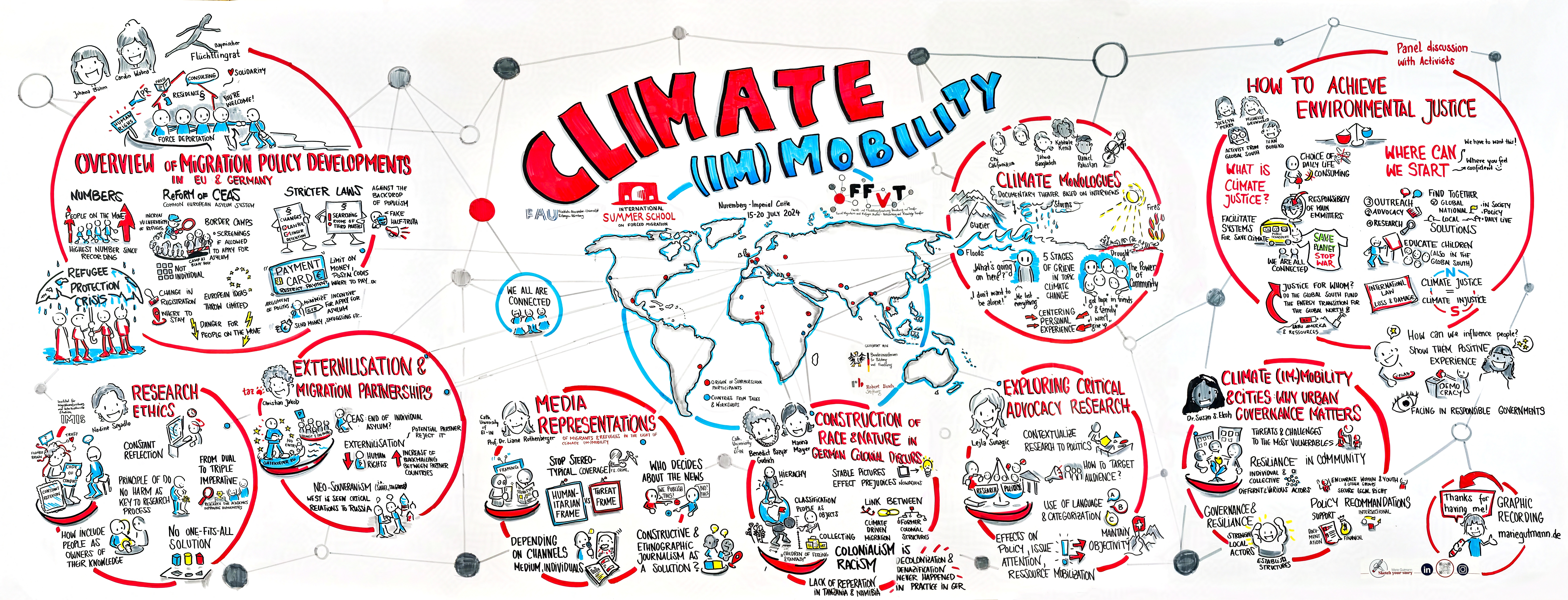
For more impressions of the FFVT Summer School 2024, you are welcome to follow our Instagram account: https://www.instagram.com/ffvt_summerschool/
Participants of the FFVT Summer School 2024:
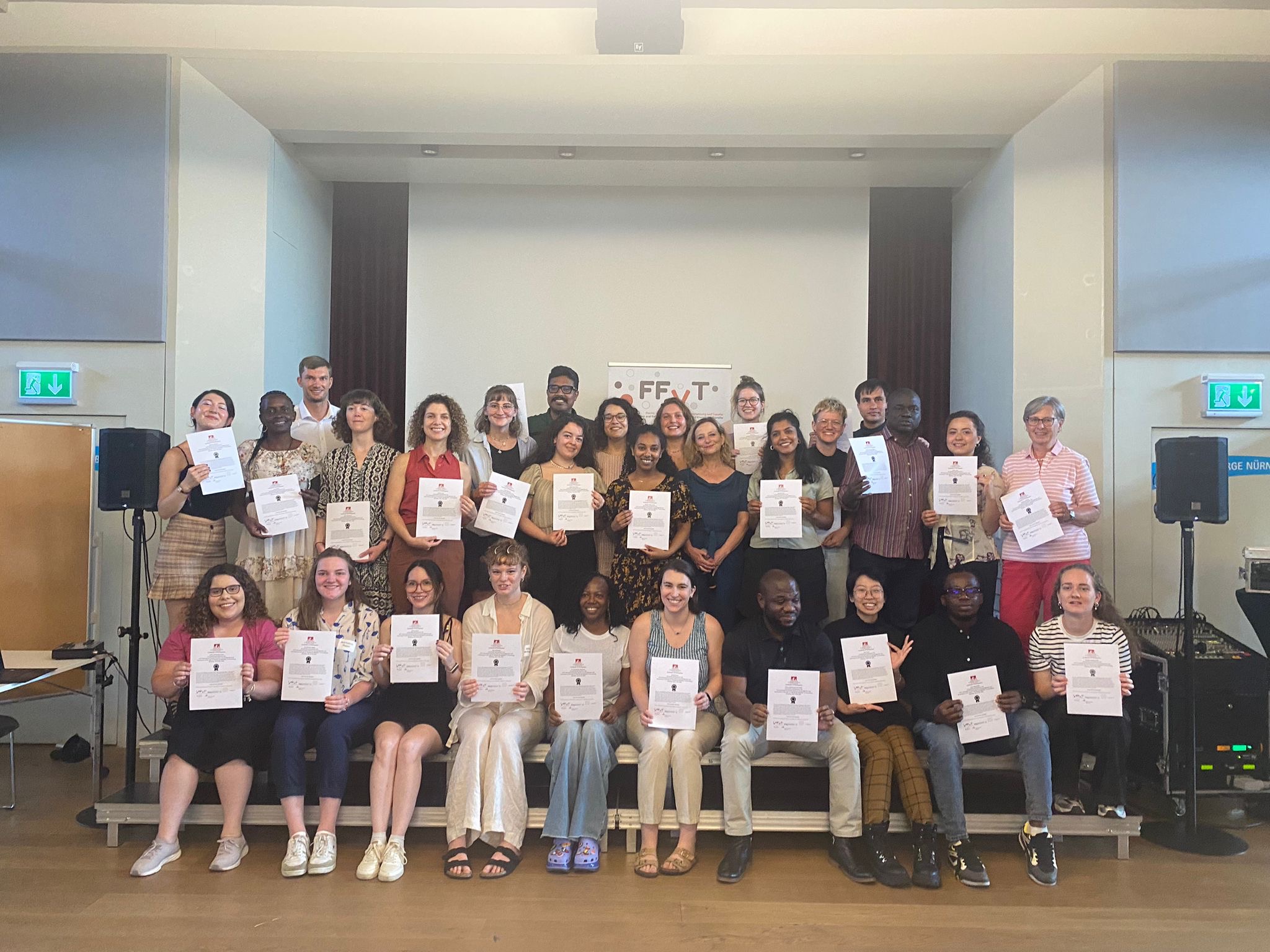
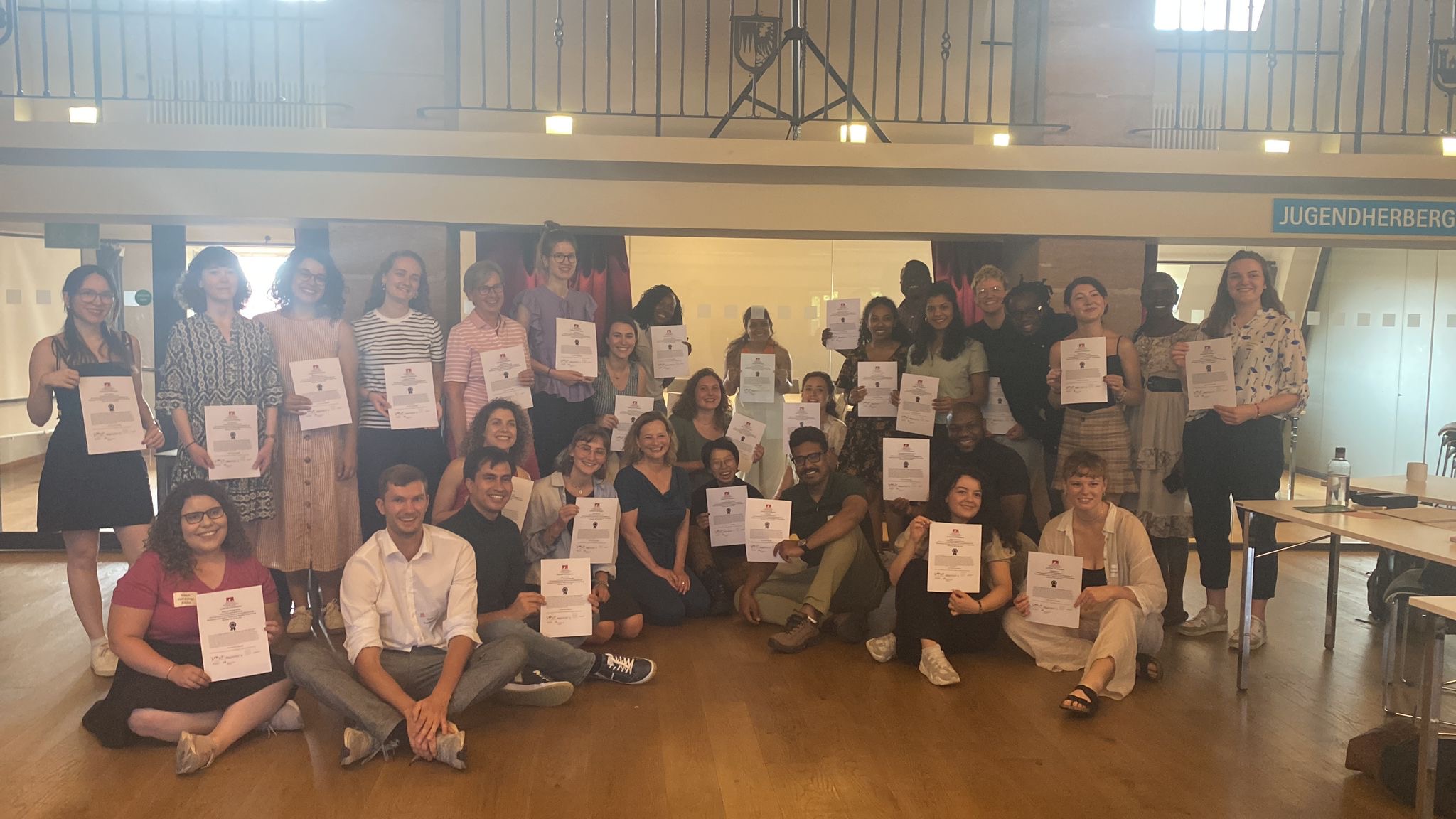
We would like to thank all contributors who enriched this first FFVT Summer School 2024:
Prof. Dr. Walter Kälin, Envoy of the Chair of the Platform on Disaster Displacement
Dr. Rainer Huhle, Nuremberg Human Rights Center (NHRC)
Prof. Dr. Michael Krennerich, Academic Director of the FAU Research Center for Human Rights Erlangen-Nürnberg (FAU CHREN)
Felix Reiter, Noël A. Jörissen and Johanna Marie Mederer, Co-editors of the Expert Opinion resulting from the FAU Human Rights Clinic on “Climate Change and displacement: Protection for climate refugees”
Dr. Lisa Thalheimer-Prezyna, Institute for Environment and Human Security at United Nations University (UNU-EHS), Bonn
Dr. Oluwatoyin Adejonwo, Senior Lecturer at Faculty of Law, University of Lagos and founding director of the Center for Climate Change and Sustainable Development (3CSD)
Dr. Benjamin Schraven, Consultant and Senior Associate Fellow of the German Institute of Development and Sustainability (IDOS)
Dr. Julia Kieslinger, Researcher at the Institute of Geography, FAU
Dr. Christoph Herrler, Deputy head of the department ‘Climate Protection & Transformation Education’ at the Independent Institute for Environmental Issues (UfU)
Dr. Kira Vinke, Head of the Center for Climate and Foreign Policy at the German Council on Foreign Relations, Berlin
Jocelyn Perry, Senior Advocate and Program Manager of the Climate Displacement Program at Refugees International
Dr. Axel Kreienbrink, Director of the Migration, Integration and Asylum Research Centre at the BAMF; Senta Türke (BAMF)
Prof. Dr. Christoph Safferling, Chair for Criminal Law, Criminal Procedure, InternationalCriminal Law and Public International Law and Director of the International Nuremberg Principles Academy
Dr. Johannes Siegmund, authorn and lecturer at the University of Vienna
Johanna Böhm and Carolin Wabra, Bavarian Refugee Council
Nadine Segadlo, Research Associate at the Institute for Migration and Intercultural Studies (IMIS)
Christian Jakob, Journalist for the daily newspaper Tageszeitung (taz) and author
Prof. Dr. Liane Rothenberger, Professor of Media and the Public with a Focus on Migration at the Catholic University of Eichstätt-Ingolstadt
Benedict Bazyar Gudrich and Marina Mayer, researchers at the chair of displacement and migration research, Catholic University of Eichstätt-Ingolstadt
Dr. Susan S. Ekoh, Researcher in Environmental Governance at the German Institute of Development and Sustainability (IDOS)
Lejla Sunagic, PhD Student at Lund University and Visiting Fellow at the Institute for Migration Research and Intercultural Studies, Osnabrück University (IMIS)
Michael Ruf, writer & director of the documentary theatre "The Climate Monologues” and all actors
Michelle Grunwald, Master student at the University of Potsdam and Fridays for Futuren activist; Ivanko Bobeiko, Activist
Dr. Sarah Louise Nash, Researcher at the University for Continuing Education Krems
Prof. Dr. Heiner Bielefeldt, Chair in Human Rights and Human Rights Politics, FAU
The call for applications for the FFVT Summer School 2024: Call for Applications
→ /files/03/17/Call-for-applications_FFVT-International-Summer-School-on-Forced-Migration-and.pdf
About the FFVT Summer School:
The interdisciplinary FFVT International Summer School on Forced Migration and Governance trains experts of the future and creates new forms of global networking. In addition to scientific qualification, it aims at the transfer of knowledge between researchers, universities and practitioners. Institutionally, the Summer School is supported by the FFVT network as well as a consortium of three migration and refugee-related Master's programmes at the University of Osnabrück (IMIS), the KU Eichstätt and the FAU Erlangen-Nuremberg.
The biennial Summer School is dedicated to the configurations of forced migration regimes in different parts of the world and at different levels of governance. It focuses on a variety of topics - from the establishment of regional refugee regimes, the development of international refugee law and human rights law to postcolonial and gender-specific perspectives on forced migration and refugee policy.
FFVT Summer Schools place emphasis on interactive learning approaches. In addition to lectures, scholars provide interactive workshops in order to discuss and reflect on central subjects with the participants. This first Summer School of the FFVT project was complemented by a cultural program, excursions in Nuremberg, the ‘City of Peace and Human Rights’, and a gathering with practitioners working in the field to promote further debate. Finally, FFVT Summer Schools also offer time and space for participants to present their own projects as well as enter into discussion with others and thus network.
Previous Summer Schools:
FFVT Summer School 2022
How has international refugee law evolved, which gaps remain and how can we address them? How are refugees protected in the different regions of Europe, Africa, Latin America, Asia and the Middle East? Which challenges are refugees exposed to locally? These and many additional questions were at the core of the FFVT Summer School 2022 “Displacement, Governance and Human Rights”.
The interdisciplinary Summer School was hosted by the Centre for Human Rights Erlangen-Nürnberg (CHREN) as a part of “Forced Migration and Refugee Studies: Networking and Knowledge Transfer” (FFVT) and took place in Nuremberg, Germany, from 10 to 15 July 2022. Participation was open to Master students as well as PhD candidates, Postdocs and junior practitioners of any disciplinary background. The Summer School dealt with the changing configurations of today’s global refugee regimes in different parts of the world and on different levels of governance, providing insights into a plethora of topics:
• the historical emergence of the global refugee regimes, including postcolonial perspectives,
• global, regional, national and local governance and administrative practices,
• social integration,
• education in refugee accommodations,
• analyses of refugee-related discourses and media portrayals of asylum,
• gender and displacement,
• practices of resistance and solidarity,
• multiple actors’ perspectives, including experiences made by people on the move themselves, as well as
• crosscutting issues and research ethics.
Download Program reader
Have a look at the Summer School Aftermovie 2022 with insights into the talks and excursions from our participants: https://youtu.be/wGTIaqX_v2o
***Please note: the application deadline for participation has already ended.***
Graphic recording of the first Summer School day - by visual facilitator Laura Heming:
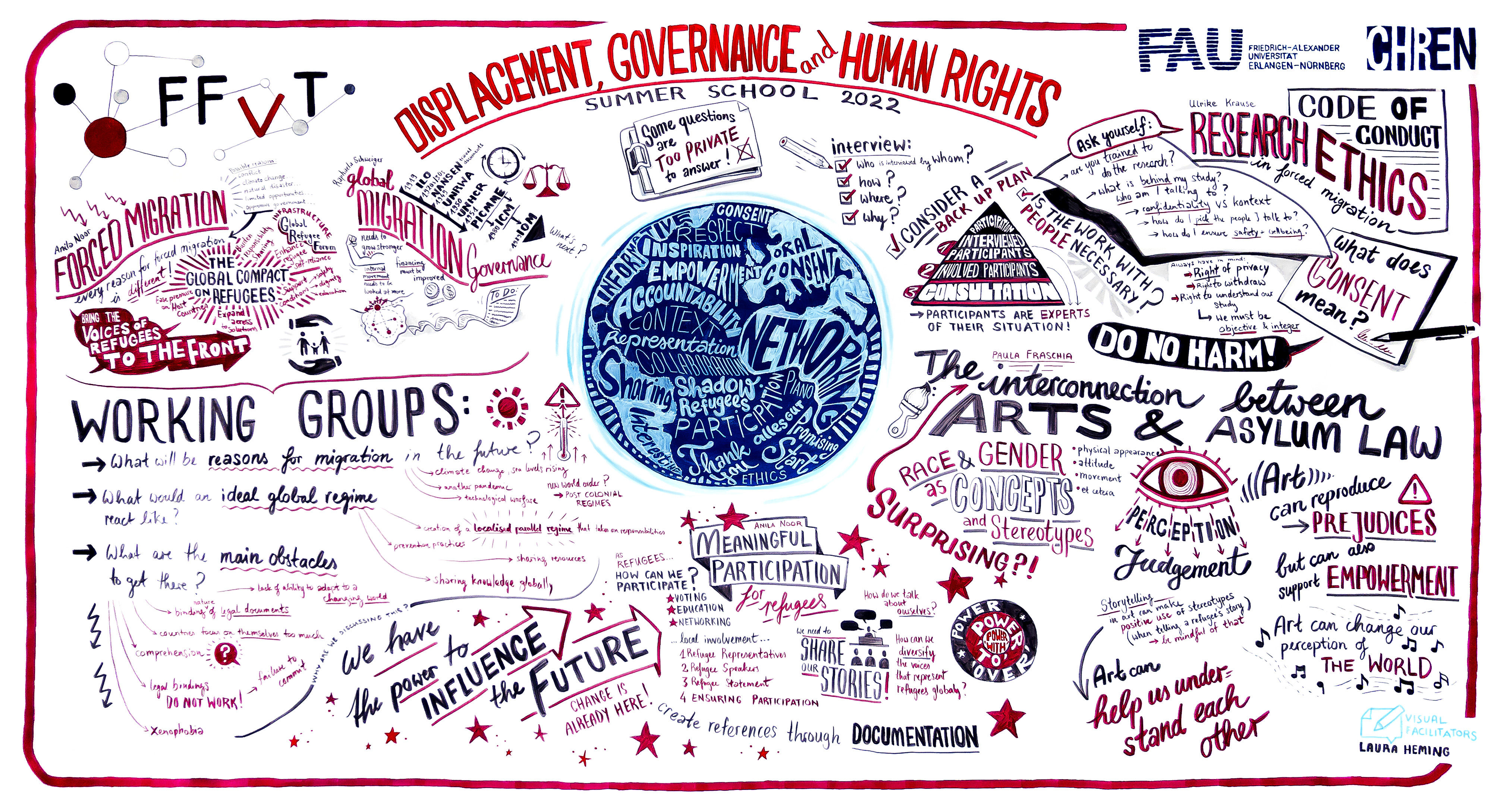
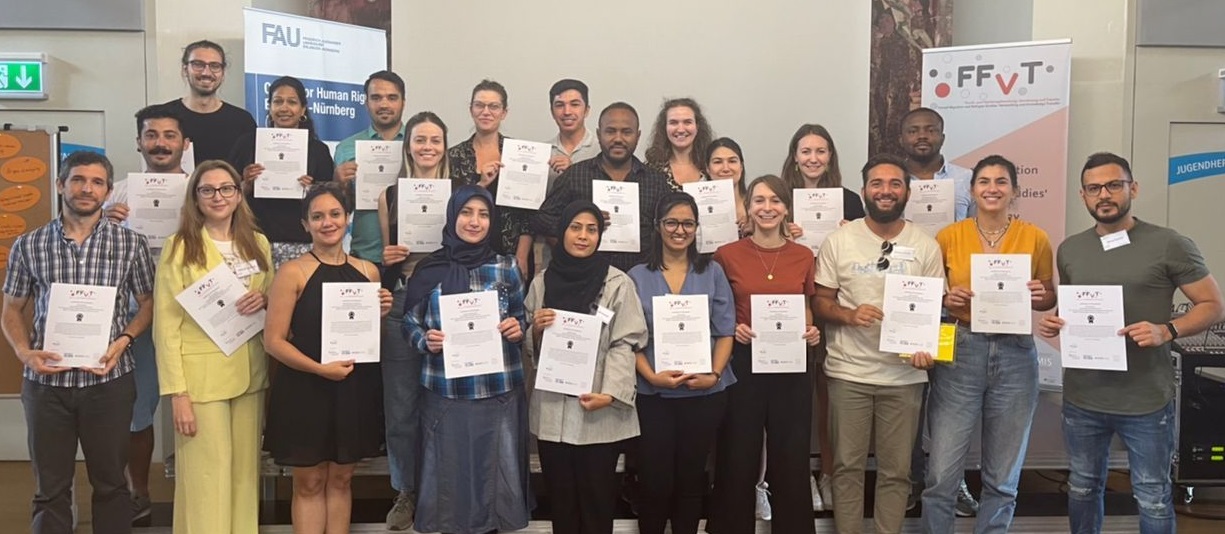
We would like to thank all contributors who enriched this first FFVT Summer School 2022:
Elisabeth Beck, Center for Flight and Migration Eichstätt-Ingolstadt
Prof. Dr Petra Bendel, Friedrich-Alexander-University Erlangen-Nürnberg (FAU)
Dr Tamirace Fakhoury, Global Refugee Studies Research Group (GRS), Aalborg University Copenhagen
Paula Fraschia, International University College of Turin
Dr Jörn Grävingholt, German Institute of Development and Sustainability (IDOS)
Prof. Dr Kevin Grieves, Whitworth University
Dr Rose Jaji, University of Zimbabwe / German Institute of Development and Sustainability (IDOS)
Dr Stefan Kordel, Friedrich-Alexander-University Erlangen-Nürnberg (FAU)
Prof. Dr Ulrike Krause, Institute for Migration Research and Intercultural Studies (IMIS), Osnabrück University
Katharina Lumpp, UNHCR Germany
Dr Charles Martin-Shields, German Institute of Development and Sustainability (IDOS)
Marina Mayer, Center for Flight and Migration Eichstätt-Ingolstadt
Dr Margaret Monyani, University of the Witwatersrand
Dr Khangelani Moyo, Global Change Institute, University of the Witwatersrand
Anila Noor, Policy Advisor on Diversity, Integration & Gender Inclusion; Member of the Expert Group on the Views of Migrants in The Field Of Migration, Asylum & Integration; TEDx Speaker
Prof. Dr Liane Rothenberger, University Eichstätt-Ingolstadt
Prof. Dr Ranabir Samaddar, Calcutta Research Group
Dr Raphaela Schweiger, Friedrich-Alexander-University Erlangen-Nürnberg (FAU) / Robert Bosch Foundation
Dr Lorenz Wiese, Centre for Human Rights Erlangen-Nürnberg (CHREN) / Friedrich-Alexander-University Erlangen-Nürnberg (FAU)
Franziska Ziegler, University of Hildesheim